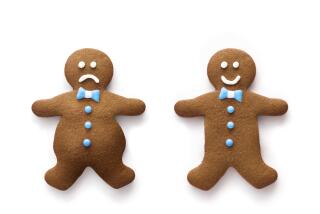Living, well or not, is the best revenge
- Share via
Somewhere along the way in our News You Can Use culture, good health has taken on the patina of virtue. Like good grades and job promotion, health is seen as bestowed upon those who work for it. There’s no excuse for not doing everything you can, not with all the lists of necessary practices in popular magazines, not with all the attention to disease prevention.
The flip side of this is the judgment passed on those who get sick. They must have done something wrong, their diet must be flawed or they are overweight or drink too much or don’t drink enough. Weight is the easiest handle for bestowing blame because we can see it and because we have been taught to associate all manner of poor habits with excess weight. But there are other handles. Somebody, somewhere is drinking a latte with whole milk rather than nonfat and someone else is driving three blocks instead of walking.
In November 2006, researchers at Harvard Medical School announced a study finding that the more red meat a woman eats through her 20s and 30s, the greater the likelihood that she will develop breast cancer, particularly hormone-positive breast cancer. Vegetarians all over were patting themselves on the back and feeling quite good. I would have been feeling quite good myself except that I had been diagnosed with breast cancer two years before, breast cancer of the hormone-positive variety -- even though I’d become a vegetarian when I was 21 years old and hadn’t knowingly eaten meat since.
I am still a vegetarian. For many reasons, this habit will always be a part of me. And I don’t doubt the study. On the whole, people who avoid red meat will most likely benefit. But this particular talisman did not work for me; it did not ward off the evil illness. I resist the impulse to feel betrayed and ask, “If I did everything right, how could this happen to me?” I resist this impulse because I do not believe we earn our illnesses, even the illnesses that are directly the result of personal habits.
We live our lives with whatever mix of things that give us pleasure and steps we take to be responsible, and sometimes we enjoy health and sometimes we get sick. But if we live only within the bounds of responsibility, if we forgo completely the pleasures, we will miss the point of all this striving for longevity, the whole reason for living. And we might get sick anyway.
I am not advocating an abandonment of healthy practices. I have been in good health and in bad, and good health is certainly preferable -- it makes the days pass more gently. I would like to live into old age. But the emphasis in that sentence is on both “live” and “old age.” I do not want my life to be a grim trudge to the finish line. And I do not deserve to be judged, not for my illness and not for the glass of wine I drank last night.
Our approach to healthcare, especially for those fortunate enough to have access to good care, is increasingly weighted toward prevention. This makes sense. It is more effective, easier and less expensive to prevent an illness than to try to treat it after it develops. But imagine for a moment a different model. Imagine a healthcare system built around the idea that we should all engage in the habits we choose and we will have treatments for any and all medical problems that result. We would be free and clean up the mess later. This is a utopian idea but one that we rebel against and not just because it is more costly. It seems so wrong. It rewards bad behavior. We should pay for our sins; we are not entitled to enjoy them.
We take our medicine with a side order of morality because it is within the doctor’s office and the hospital that scores are tallied and winners are distinguished from losers. Scores must be tallied somewhere, otherwise there would be no reward for all the hard work of keeping healthy, no prize for all the self-denial of doing everything right. We did not pass up all those rich desserts for nothing.
It probably isn’t possible to live unconsciously, to relieve ourselves of the burden of carrying ourselves forward. We know too much, and it is perfectly understandable that we are greedy for every bit of life and health we can grab. But there should also be room to grab onto the things that make life joyful and fun. Perhaps the trick is to acknowledge that there is no magic formula for keeping our bodies going. We’re all guessing here.
And since we’re all creating our own collection of things we have to do and things we want to do, we should suspend judgment on how others approach these questions.
--
Lewis is a writer living in Washington, D.C.


